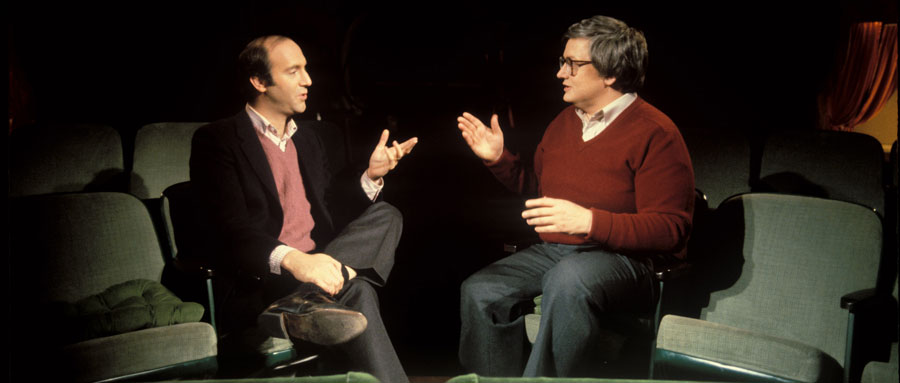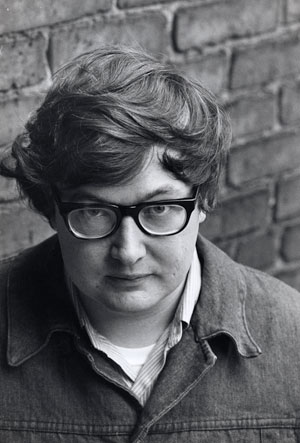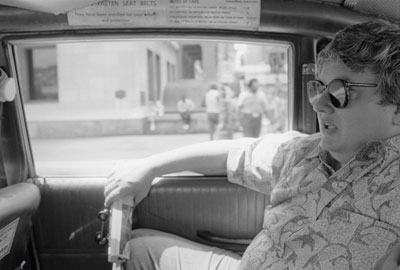LIFE ITSELF

Release Date: 2014
by Scott Foundas -- Chief Film Critic, Variety
A life spent at the movies gets the cinematic epitaph it richly deserves in “Life Itself,” documentarian Steve James’ meticulous and intensely emotional portrait of the late Roger Ebert. Given unfettered access to Ebert during what turned out to be the last four months of the venerated critic’s life, James cuts — as in all of his best work — straight to the human heart of the matter, celebrating both the writer and the man, the one inseparable from the other, largely in Ebert’s own words. One can only hope that this CNN Films presentation, a natural for wide fest play, will also end up on the bigscreen, where Ebert himself surely would have wanted it.
James, whose own association with Ebert dates back to 1994 (when the critic waged an impassioned campaign on behalf of the director’s debut feature, “Hoop Dreams”), began filming in December 2012, just as Ebert was admitted to a Chicago rehab hospital for a hairline hip fracture. It was Ebert’s seventh stay at the facility since the 2006 cancer surgery that left him without much of his jaw and unable to speak or eat. And yet, in spite of his latest medical setbacks, Ebert remains eager for James to film — joking jubilantly with his nurses one moment, undergoing the clearly painful process of having his throat drained by suction the next, and later struggling to walk during a grueling physical therapy session. Through it all, Ebert’s computer is never far from hand, as he continues to write reviews and blog entries, and makes conversation through a computerized voice box.

From there, James delves into Ebert’s biography, not so much chronologically as impressionistically, guided by the critic’s email responses to questions James sends him during his rehab (a kind of pre-interview for an anticipated longer, in-person sitdown that never transpired). Also quoted at length are passages from Ebert’s 2011 memoir, also titled “Life Itself,” which are read on the soundtrack by voice actor Stephen Stanton. Enriched by marvelous archival photographs and reminisces from friends, colleagues and drinking buddies, James’ film traces Ebert’s prodigal journey from a newspaper-obsessed childhood to the editorship of his college paper, the Daily Illini, where the impassioned young Ebert wrote fiery editorials in support of the civil rights movement and even once stopped the presses to prevent a tasteless advertisement from appearing opposite the news of JFK’s assassination.
As the film moves into Ebert’s professional career at the Chicago Sun-Times, where he became the youngest daily newspaper critic in the country, James vividly evokes a bygone era of rolled-sleeve Windy City newsmen and the storied watering holes where they caroused until dawn. Among the docu’s most candid sections is the one devoted to Ebert’s battle with alcoholism, which he admits would have ended both his life and career had he not joined AA in 1979. (It was at an AA meeting, it is revealed here for the first time, that Ebert met his future wife, Chaz.)
Unsurprisingly, much of “Life Itself” is given over to Ebert’s democratizing and popularizing impact on the world of film criticism, with judiciously chosen clips (“Bonnie and Clyde,” “Cries and Whispers,” “Raging Bull”) and excerpts from those same films’ respective reviews used to show how Ebert combined his encyclopedic knowledge of cinema with an accessible, plainspoken writing style that could be understood by anybody. Filmmakers including Errol Morris, Werner Herzog and Martin Scorsese (also an executive producer here) speak to the specific contributions Ebert made to their careers, Scorsese tearing up as he remembers a tribute Ebert and his TV sparring partner Gene Siskel organized for him in Toronto at one of the lowest moments of his personal and professional life.
Of course, it was TV that made Ebert a cherished cultural institution, and “Life Itself” delights in taking us behind the scenes of the long-running series that began on public television as “Opening Soon at a Theater Near You” (with, as clips here attest, neither host quite yet ready for primetime) and evolved into the syndicated “Siskel & Ebert.” Veteran show producers, along with Chaz Ebert and Siskel’s widow, Marlene Iglitzen, recall how the rival newspapermen barely spoke to each other in private during the early years of the program, only to eventually grow very close (a friendship cut short by Siskel’s own cancer-related death in 1999).

James also takes time to show that not everyone was so enamored of the TV program and its iconic thumbs-up, thumbs-down judgments, with some critics (including Film Comment’s Richard Corliss, who published a lengthy attack piece later rebutted by Ebert) bemoaning what they saw as its crass consumerization of film reviewing. But compared to what passes for informed debate — of movies or anything else — on TV today, the “Siskel & Ebert” clips included here seem almost a model of erudite discourse.
The heart of “Life Itself” — and of Ebert’s life, itself — is the love story between Roger and Chaz, whom he married at age 50 after having more or less resolved that he would spend the rest of his life alone, and who would prove to be his tower of strength throughout his prolonged illness. Interviewed at length here, Chaz’s warm presence, her effusive love for her husband, and her palpable fear of losing him permeate the film, especially when Roger is diagnosed with newly discovered spinal tumors and resolves that, this time, he no longer has the will to fight. “This is the third act and it is an experience,” he tells James bravely, even as we can plainly see that Chaz is not nearly so ready to let go.
Cliché as it may be to say, there’s no denying that Ebert’s encroaching mortality made him appreciate life all the more: He threw himself into his writing with renewed vigor (the only time, he tells James, he felt like his old self), reflecting not just on cinema, but on politics, religion and other issues of the day. But the title “Life Itself” is fitting in another regard, too; it evokes one of Ebert’s favorite films, Akira Kurosawa’s “Ikiru,” whose title is Japanese for “to live.” That film tells the story of a cancer-stricken Tokyop bureaucrat determined to build a children’s playground as a valedictory gesture before he dies, and James includes an unidentified clip from it here in a montage near the end of “Life Itself.” It is easy to think of “Ikiru,” too, when James shows us Ebert in his final days, working tirelessly on a revamped version of his RogerEbert.com website, a film buff’s playground where Ebert’s voice will live on, as it does in this film, a gleaming beacon to guide us through the moviegoing dark.
Cast & CreditsDirector: Steve James
Martin Scorsese
Werner Herzog
Roger Ebert
Errol Morris
Ava DuVernay
Ramin Bahrani
Stephen Stanton
Chaz Ebert
A.O. Scott
Marlene Iglitzen

